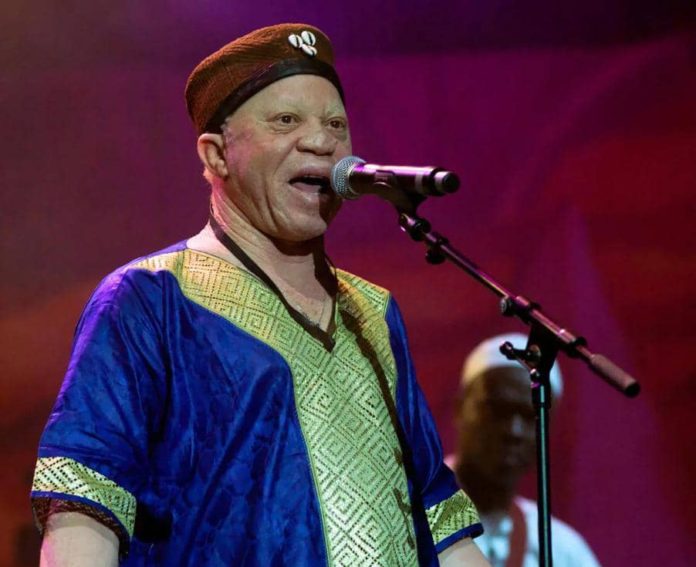Salif Keita, from Mali, is one of the most influential musicians on the African continent. Known as the “Golden Voice of Africa”, Keita was born with albinism.
To spread awareness of the ailment, he established the Salif Keita Global Foundation in 2005.
His award-winning record La Différence was committed to putting an end to albinism-related human rights abuses worldwide.
Keita’s music is influenced by many African genres such as Wassoulou, Songhai blues, and Bambara music which is all part of his traditional heritage.
Early Life
The descendant of warrior princes, the son of two black African parents, Afro-pop pioneer Salif Keita was born “white”.
Inheriting albinism, Keita instantly stood out among other Africans and stood up for tolerance in all forms.
The condition is often misinterpreted as an ill omen in his native Mali, making Keita an outcast in his own community.
He also battled with the stigma associated with his skin tone.
Although he was born into a noted lineage of musicians with direct links to Sounjata Keita – the heroic 13th-century warrior-prince who edified the ancient Malian Empire, Keita was forbidden to play music growing up.
He was also disowned by his father, kicked out of school, and rejected by the local aristocracy.
Career
In the middle of the 1970s, Keita and his bandmates left Mali.
They relocated to Abidjan, Ivory Coast, where they had financial difficulties and frequently had to rent stage equipment to perform.
In the following years, the band’s popularity rapidly increased under its new name, Les Ambassadeurs Internationaux.
Their 1978 album, Mandjou, became an overnight success in West Africa.
In 1976, Sékou Touré, the President of Guinea, made Keita an Officer of Guinea’s National Order of Merit.
The President had been a fan of Keita and the band since they met during an official visit in 1974.
Touré had remained a fan and supporter even after they fled Mali. Wanting to reciprocate the honour, Keita composed the track “Mandjou” (featured on the eponymous 1978 album) as a praise song for Touré.
Keita moved to Paris in 1984 to reach a larger audience and to pursue a solo career.
His music combined traditional West African music styles with influences from both Europe and the Americas.
At that time, Keita was famous in Africa and had a strong fan base around the world.
Soro became his international-breakthrough album in 1987. The project was produced by Ibrahima Sylla, a visionary who had already discovered dozens of African stars.
Musical instruments that are commonly featured in Keita’s work include balafons, djembes, guitars, koras, organs, saxophones, and synthesizers.
He performed at the Nelson Mandela 70th Birthday Tribute concert in 1988 to call for Nelson Mandela’s release from prison.
In 1990, Keita contributed “Begin the Beguine” to the Cole Porter tribute/AIDS benefit album Red Hot + Blue, produced by the Red Hot Organization.
Keita found success in Europe as one of the African stars of world music, but his work was sometimes criticised for the gloss of its production and for the occasional haphazard quality[citation needed].
However, shortly after the turn of the millennium, he returned to Bamako in Mali to live and record.
His first work after going home, 2002’s Moffou, was hailed as his best album in many years. He was also inspired to build a recording studio in Bamako, which he used for his album M’Bemba, released in October 2005.


